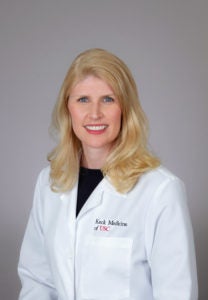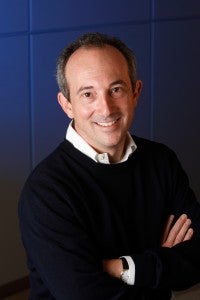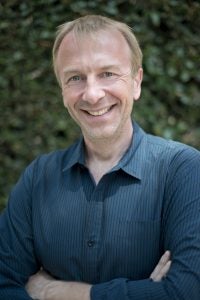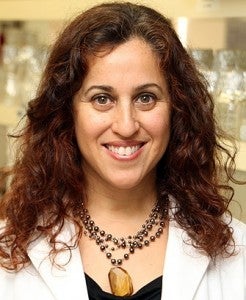Contact: Jenesse Miller (213) 810-8554 or jenessem@usc.edu
Early detection of breast cancer is the key
 “The best advice I can give women is, know your breasts,” said Maria Nelson, breast surgical oncologist at the USC Norris Comprehensive Cancer Center. “Pay attention to and alert your doctor if there are any changes, such as a new mass, redness, nipple discharge, dimpling or thickening of the skin or lumps under the armpit.
“The best advice I can give women is, know your breasts,” said Maria Nelson, breast surgical oncologist at the USC Norris Comprehensive Cancer Center. “Pay attention to and alert your doctor if there are any changes, such as a new mass, redness, nipple discharge, dimpling or thickening of the skin or lumps under the armpit.
“Early detection of cancer leads to the best outcomes.”
She added:
- Don’t skip mammograms. A normal result one year doesn’t mean next year’s screening won’t show changes.
- Women with dense breasts should visit a center that offers 3D mammograms to detect small, subtle cancers a traditional mammogram may not pick up.
- Some centers, like the USC Norris cancer center, also have breast-trained radiologists who only read breast imaging, resulting in more accurate diagnoses.
Dr. Nelson is experienced with advanced breast surgical techniques; her research interests include the diagnostic role of breast imaging techniques and the complex nature of decision-making in breast cancer care.
Contact: Gabriella.robison@med.usc.edu or (323) 865-7657
The future of cancer treatment: personalized care
“Science can directly impact patient outcomes through evidence-based and reproducible experimental designs that put the patient at the center of research,” said Peter Kuhn, founding member of the USC Michelson Center for Convergent Biosciences. “Integrating both the basic research breakthroughs and the tremendous clinical advances can enable our understanding of current limitations of treatment success for individual patients.”
He added:
- The USC Michelson Convergent Science Institute in Cancer is directly aimed at this challenge.
- The Institute is enabling collaborations through patient and clinical partnerships with advanced scientific and technological competencies across the university.
Dr. Kuhn is the Dean’s Professor of Biological Sciences and professor of medicine and engineering at USC. He leads USC’s Convergent Science Initiative in Cancer (CSI-Cancer). Kuhn’s research team in physics oncology has discovered new ways that cancer spreads through the human body and is using those breakthroughs to impact personalized care strategies.
Contact: kuhn42@usc.edu or (213) 821-3980
A revolution in using machine learning
 “The new hope in the room is not in medicine, but it’s in big data,” said David Agus, director of the Lawrence J. Ellison Institute for Transformative Medicine of USC. “The real revolution in data is we can start to categorize cancer. So instead of just lumping it by where it came from, we’re going to start to personalize how we understand, how we categorize and how we treat disease.”
“The new hope in the room is not in medicine, but it’s in big data,” said David Agus, director of the Lawrence J. Ellison Institute for Transformative Medicine of USC. “The real revolution in data is we can start to categorize cancer. So instead of just lumping it by where it came from, we’re going to start to personalize how we understand, how we categorize and how we treat disease.”
- Agus and colleagues use machine learning to diagnose breast tumor molecular features faster, which is key to quicker prognosis and treatment.
- Aided by machine learning, they taught a computer to assess tumors and identify which ones were more susceptible to targeted treatment. Their findings, published last year, marked a big step forward from microscopes and cell biopsies.
Dr. Agus is a professor at the Keck School of Medicine of USC and the USC Viterbi School of Engineering and leads a multidisciplinary team of researchers dedicated to the development and use of technologies to guide doctors in making health-care decisions tailored to individual needs. He can speak about programs at the Ellison Institute, including the use of artificial intelligence in digital pathology to determine therapy of breast cancer patients, mathematical models to predict outcome in breast cancer patients, and molecular characterization of breast cancer.
Contact: agus@usc.edu or (310) 272-7640
Is there a link between diet and breast cancer risk?
“We know that diet may contribute up to 30 percent of the cancer burden,” said Mariana Carla Stern, professor of Preventive Medicine & Urology at the Keck School of Medicine of USC. “Given that most cancers are caused by multiple factors that act jointly, and likely in different combinations in different people, the more we know about modifiable risk factors that we can change, the more we can reduce the cancer burden in the population.”
- Stern’s research has found Latinas who eat processed meats such as bacon and sausage may have an increased risk for breast cancer. Latinas who consumed about 20 grams of processed meat per day were 42 percent more likely to be diagnosed with breast cancer compared with Latinas who ate no or little processed meats.
- The study adds to evidence that genetics and lifestyle choices affect cancer risk, and specifically to evidence of the negative health effects of consuming processed meat such as bacon, beef jerky and lunch meats.
- Stern was also co-author of another analysis looking at 15 studies on red and processed meat consumption and breast cancer risk, which found processed meat consumption was associated with a 9% higher breast cancer risk.
Dr. Stern is the associate director of population sciences at the USC Norris Comprehensive Cancer Center and program director of the CaRE2 Health Equity Center. Her research interests include diet and cancer and cancer health disparities in Latino populations.
Contact: marianas@usc.edu or (323) 865-0811
Image via Pixabay





